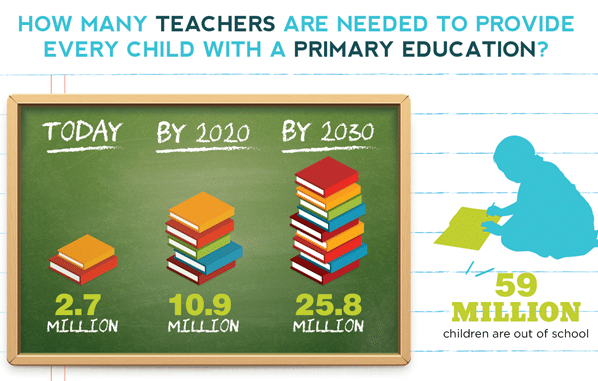There’s a teacher shortage currently affecting the United States. But, that’s not exactly news.
The last decade has been marked by numerous education policies that promoted competition over collaboration, testing over teaching, and blaming teachers rather than valuing them. As a result, enrollment in teacher programs declined dramatically, and around 50% of new teachers leave within five years. So, what can we do about that?
In this article, we try to understand the reasons behind the teacher shortage and look for solutions that could attract and retain talent.
The Many Reasons Why Teachers Leave
Teachers always come and go, but the turnover increased dramatically in recent years. A 2013 poll showed that teachers today are more frustrated by their jobs than they have been in previous years. The survey found that job satisfaction had declined from 62% in 2008 to 39% in 2013. About 51% of teachers reported feeling under great pressure every day.
And that’s understandable. Teachers must fight for the tools they and their students need, and struggle with the high cost of living. Many spend thousands of dollars out of their pockets for classroom supplies every year. But, in spite of their sacrifices, current policies challenge teachers instead of helping them.
A teacher is required to produce an enormous volume of paperwork to justify their classroom planning and record results. The long hours of office work along with restrictive national curriculum, performance-related pay, taxing inspections, and massive student testing turned schools into competition-based institutions rather than collaborative ones.

Solutions That Can End the Current Teacher Shortage
We often look at Northern Europe for lessons about how they educate their children. But, we should also learn from them how to treat our teachers. They put a lot of focus on mentoring, teacher preparation, collaboration, and remuneration.
With that in mind, here are three solutions that could put a stop to the current teacher shortage.
1. Pay Teachers More
It goes without saying that better salaries help teachers feel valued and encourage graduates to choose a career in education. A growing body of evidence also suggests that there’s a clear connection between higher teacher pay and improved academic achievements.
According to one international study, a 10% increase in teacher salary corresponds with a 5-10% increase in educational results.
Teachers in low-income school should receive larger compensations than those in privileged areas. There are numerous teachers who would choose a lower-income school for a better salary. Not because they are greedy, but because they have to face more challenges, and the health risks associated with stress are higher.
2. Focus on Collaboration, Not Competition
According to an Education Trust Report, teachers care more about having a good administration more than they care about their paycheck. They want an administration that listens to their needs and will invest in them. They want to work in an environment that promotes cooperation, not competition. So, you can’t really blame teachers for wanting to move from schools where they are constantly told that they are not good at their jobs.
3. Extend the Concept of Effective Teaching
Because the US is testing students on an industrial scale, teachers are judged solely based on whether their pupils have met the targets on standardized tests. Even if the students have made impressive academic progress, low pass rates usually mean that the teacher is not efficient. That should stop.
Judging teachers solely on the performance of their students in standardized tests can affect their morale and self-esteem. Because the stakes are so high, and most schools pay based on performance, many teachers move to schools where students are already at or above national expectations. That way, they don’t have to worry about being undervalued or criticized by parents and the community for their teaching methods.
The need for a shift in mentality is more than obvious. We should stop value performance based on academic achievements alone and start paying more attention to individual progress as well.
Even though the teacher shortage isn’t new, that doesn’t mean that it isn’t important. Education is a vital strength, and we should build upon it. Our future depends on getting smarter, and that means giving teachers the means they need to be effective. They deserve to work in better conditions, and their compensation should reflect the importance of their work.










